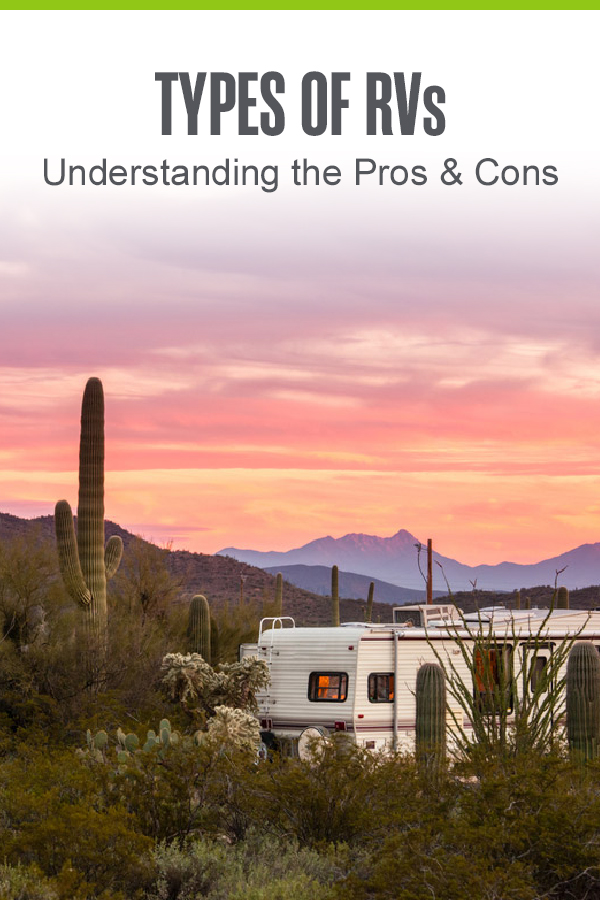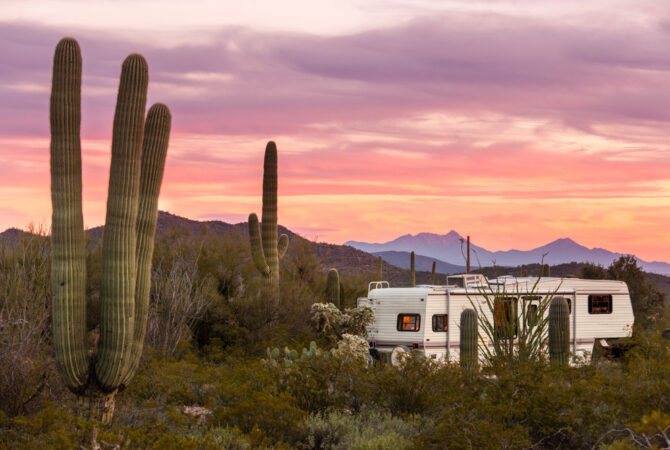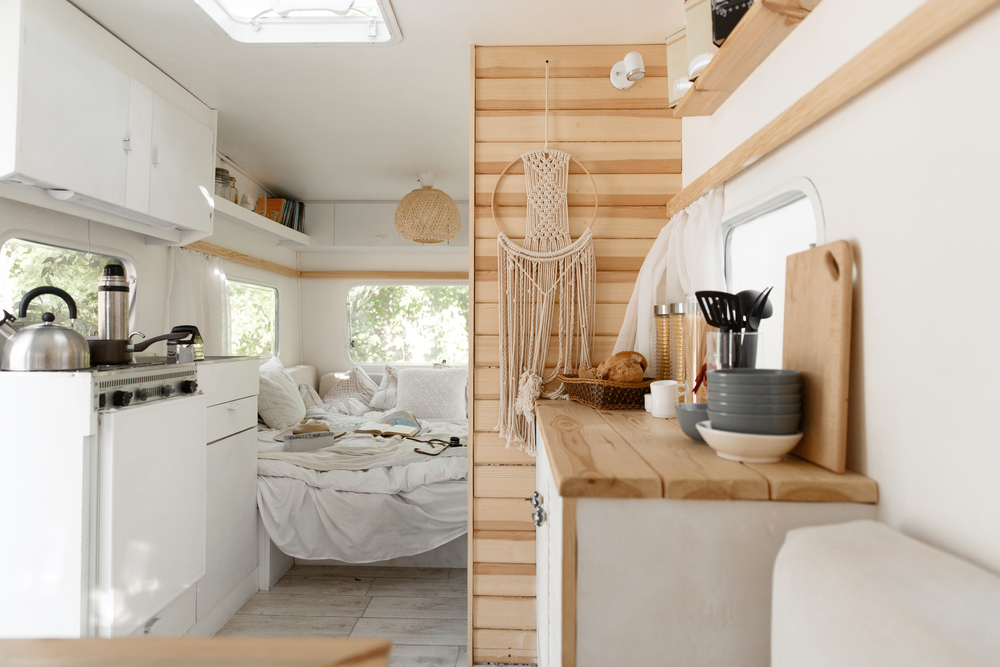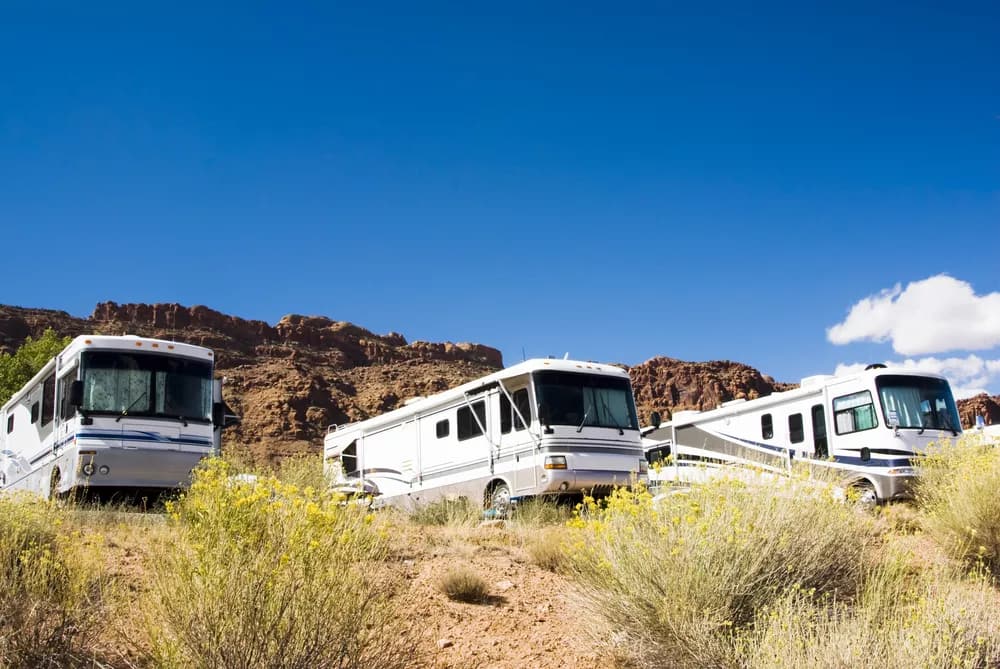Searching for the best recreational vehicle for traveling on the road? Whether you’re searching for the best RV to live in full-time or you’re just looking for the most budget-friendly option for weekend trips, there’s a motorhome or travel trailer that can work for your needs! Before purchasing a recreational vehicle, ask yourself these questions:
- What’s my budget?
- How long of trips do I plan to take?
- How many people will be traveling with me?
- How much weight can my vehicle tow?
- How much storage space is needed for my RV?
Once you’ve considered these things, it’s time to start exploring your recreational vehicle options! Explore the pros and cons of each type of RV below.
Jump to: Motorhomes | Travel Trailers | Toy Haulers
Motorhomes
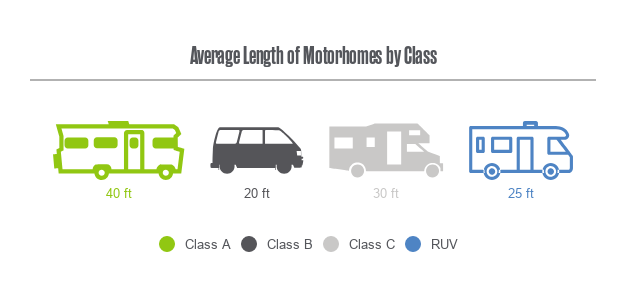
As the name implies, motorhomes are motorized RVs that offer mobile living accommodation for full-time RVers, more space, ease of driving, little to no setup time, and the ability to be used while traveling—things towable RVs cannot offer. But motorhomes do come with a higher price tag and more maintenance, and they’re often more difficult to store because of their size. Because of this, they’re typically the choice of avid RV travelers or those considering RV living. Learn more about the different classes of motorhomes to choose from below.
Class A
Class A motorhomes are the largest type of recreational vehicle available. They range from 22 to 49 feet in length, and provide everything you need to live on the road. With a spacious interior, ample storage space, comfortable seating, a smooth ride, and more, this is the ideal option if you plan to spend a significant amount of time traveling every year. Class A motorhomes are similar in size to an apartment and are equipped with full-size kitchens, bathrooms, and many sleeping and lounging areas. Budget-friendly Class A RVs can start as low as $60,000, while the more extravagant models like diesel pushers can run up to $500,000.
Pros
- Most spacious
- Most storage
- Smooth ride
- Comfortable seating
- Connected driving and living area
- Amenities like washer and dryer
- Automatic leveling
- Slide out panels for even more space
- Great option for groups or families
- Can tow another vehicle behind it
Cons
- Most expensive RV class to keep maintained and insured
- May require a special driver’s license
- Difficult to drive in tight spaces
- Still often need to tow a car for sightseeing and errands
- Gas can be expensive with an average of 6 to 10 mpg
- Difficult and/or expensive to store because of size
- The large windshield area can make it difficult to heat up or cool down
Class B (Camper Vans)
Often referred to as a camper van, Class B motorhomes are a smaller, more affordable option than both Class A and C motorhomes. Resembling a large van, camper vans are ideal for those traveling with small families, and those who don’t plan to be on the road full-time. Class B motorhomes are well-equipped camping machines and often have small kitchens, creatively configured sleeping spaces, and can fit in just about any parking lot. These usually range from 17 to 19 feet in length and $60,000 to $140,000 in price.
Pros
- Can easily drive almost anywhere a car can
- Maneuverability means you won’t need to tow an additional vehicle
- Best gas mileage of all motorhomes (between 18 to 25 mpg)
- Easiest motorhome to store & often fits in a standard-sized garage
- Least expensive to purchase
- Can tow a small boat
- Doesn’t require a special license
Cons
- Least amount of space among motorhomes
- Its small size limits comfortability to one or two passengers
- The price per square foot is the highest among all types of RVs
- Doesn’t have the features and amenities Class A or C motorhomes have (bathroom, full kitchen, two bedrooms, etc.)
- Only practical for short trips
Class C
This is the middle ground between a Class A and B motorhome. Class C motorhomes have much larger interiors than camper vans, offering room for many of the same features as Class A motorhomes. Rather than resembling a bus like a Class A, Class C motorhomes more closely resemble a moving truck. This type of RV features a distinctive cab extending over the cockpit that can serve as a sleeping area, storage space, or an entertainment center. If you have no travel trailer to tow, this option gets around 8 to 15 MPG. The average size of a Class C motorhome is 21 to 41 feet and they can range in price from $50,000 to $100,000. Class C RVs can comfortably house between four to eight people.
Pros
- Connected driving and living areas, allowing passengers to utilize living space while traveling
- Over-cab sleeping area provides additional sleeping space other motorhomes don’t have
- Smaller Class C motorhomes are relatively easy to maneuver in tight spaces
- Feels more similar to driving a truck/van than an RV
- More affordable than Class A motorhomes
- Has good fuel efficiency
- Doesn’t require a special license
- Has standard RV amenities like a kitchen, bathroom, and living area
- Easier to heat and cool because of its small windshield and cockpit area
Cons
- Limited living and storage space
- Cannot typically tow other vehicles
- Can me more difficult to drive because of its large size
- Can be prone to water leaks in the cab-over area
- No automatic leveling
- Difficult to move through living area while traveling
RUV (Recreational Utility Vehicle)
An RUV is a combination of an RV and SUV. RUV motorhomes are a new trend in the RV world and seen as a combination of Class A, B, and C motorhomes. This is due to their unique ability to combine a comfortable driving and living area, spacious interior, and exceptional mobility and maneuverability for a vehicle this size. This makes RUVs an appealing, mid-sized option for those looking to take short to medium-length trips. On average, RUVs are 23 to 28 feet long are are easier to drive due to their compact size.
Pros
- Room for the whole family to travel in
- Full of extra storage space
- Sleeping space for 3 to 5 people
- Low center of gravity enhances safety
- High-tech capabilities
- Can serve as capable haulers
- Easier to park than larger alternatives
Cons
- Smaller amenities
- Worse fuel economy than smaller motorhomes
- Spaces have to be multipurpose; need to convert areas to sleep
Travel Trailers
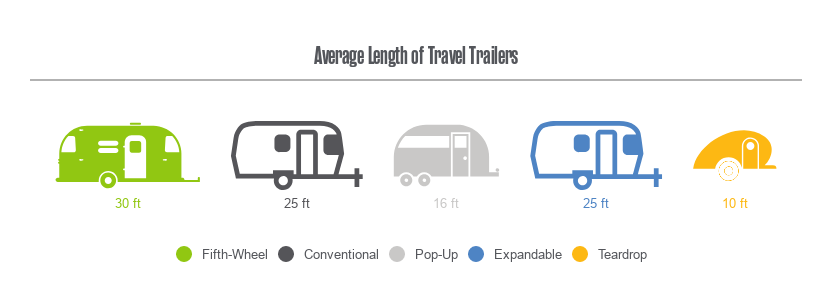
How do travel trailers differ from motorhomes? Travel trailers provide a more affordable, towable option for those interested in owning an RV. Depending on their size, travel trailers can be towed by large trucks, vans, or small to mid-size SUVs. Most travel trailers do not require a 14-foot-tall garage to store, which can save you money on storage! Travel trailers also have more interior space than motorhomes because they don’t contain driving and engine compartments, leaving more room for activities. That said, remember that it’s illegal to ride in most pull-behind campers while they’re being towed. Read more about the different types of travel trailers below.
Fifth-Wheel Trailers
The avid recreational vehicle enthusiast planning to spend most of their life at a campground should consider this option. This pull-behind camper is very similar to conventional travel trailers, but the key difference is in the front. Because fifth-wheel trailers have a raised forward section known as a gooseneck connector, your camper has a multilevel feel with extra space for working, playing, and sleeping! Prices typically range from $36,000 to $135,000.
Pros
- Spacious floor plans
- More privacy
- Designated sleeping areas
- Kitchen and bathroom are standard amenities
- Expansive storage space
- Easier to maneuver than a standard tow trailer
- No engine maintenance
- Great for staying in one spot for an extended period of time
Cons
- Needs to towed by a truck or vehicle with a fifth-wheel hitch
- Heavier and less fuel-efficient
- Limited campground spots for longer, taller models
- Priciest travel trailer option
Conventional Travel Trailers
This is likely what comes to mind when you imagine a towed trailer. While these can vary in size, most can be towed by a standard SUV, van, car, or truck with a bumper and frame hitch. Conventional travel trailers are designed for those who plan to spend a lot of time in campgrounds and need plenty of space for living with the convenience of always having an SUV or truck to get around cities. These campers typically run anywhere from $8,000 to $65,000.
Pros
- Can be towed by a variety of vehicle types
- Allows you to drive around places in your car without the trailer
- More affordable that fifth-wheel trailers
- Less difficult to find campground space
- Better for boondocking/dry camping
Cons
- Most difficult to tow and back up
- Can sway quite a bit on the road
- Lower ceilings
- Less privacy and separation between spaces
Pop-Up Campers/Fold-Down Campers
Folding camping trailers, also known as tent trailers, are perfect for travelers who love feeling the breeze when they sleep! If you’re a weekend camper or planning a few summer vacations on the road, a pop-up camper with an expandable RV canopy is an affordable option. These campers typically range from $10,000 to $20,000.
Pros
- One of the lightest travel trailers
- Budget-friendly
- Can be towed by six-cylinder vehicles
- Easy to store
- Ample kitchen, dining, and sleeping areas
Cons
- Less room for activities
- Can’t access the space while traveling
- Not well-insulated; can’t use for winter camping
- Can be noisy
- Bathrooms not usually included
- Extra time required for setup
- Needs to be aired out to prevent mold and mildew
Hybrid Travel Trailers
Expandable travel trailers offer a middle ground between tent camping, pop-up campers, and hard-sided travel trailers. Hybrid campers provide more space while still remaining lightweight and affordable with prices ranging from $15,000 to $35,000. If having a bathroom on board and more consistent space with less setup time is important to you on the road, consider this option!
Pros
- One of the lightest trailers
- More affordable than hard-sided campers
- Less nightly setup required
- More protection from the elements than pop-up campers
- Bathrooms are included in many models
- More insulation than tent campers
- Easily towed by SUVs and trucks
Cons
- Condensation can be a concern
- Bunk beds require nightly setup
- Heavier than folding campers
- Can be difficult to regulate temperature
- Needs to be aired out to prevent mold and mildew
- Can be noisy due to the fabric walls
Teardrop Camper
Looking for a small travel trailer that can be towed by practically any vehicle? Teardrop trailers are a convenient mix between camping with a tent and RV camping. This type of recreational vehicle is practical for people on a budget, as trailers start as low as $5,000. Models with more amenities can increase to around $20,000. Teardrop campers are great for couples who only need sleeping space for two and are looking to take shorter trips. Plus, the droplet shape adds a retro flair to all of your travels!
Pros
- One of the most affordable RV options available
- Lightweight and towable by almost any vehicle
- Highly maneuverable
- Low maintenance
- Cooking area/outdoor kitchen included in most models
- Good insulation
Cons
- Only large enough for two people at most
- Very limited amenities
- No bathroom
- Can’t stand up inside
Truck Campers/Slide-In Campers
Looking for something portable? If you already own a pickup truck, this could be one of the most affordable, lightweight campers for you! Truck campers make a lot of sense if you’re planning on venturing off the beaten path and need a versatile travel option. Half-ton trucks can support most truck campers, but some of the larger models with slide-outs require a one-ton truck. Regardless of the size you choose, slide-in campers are one of the most economical options on the market, with prices ranging from $5,000 to $60,000.
Pros
- Easy to store
- Simple to drive and maneuver
- Cheaper to purchase, register, and insure
- Dinettes, sleeping area, and a bathroom are common in most
- Good fuel economy, anywhere from 10 to 20 MPG
- Able to tow a small boat or extra trailer
Cons
- A truck is required for this option
- Can’t use your truck bed for extra storage
- More work to disconnect than other pull-behind campers
- Less living and working space
- May need to make modifications to your truck to support a camper
- Can be prone to maintenance and repair issues
- Slides aren’t well insulated
Toy Haulers
As the name suggests, toy haulers are designed to transport ATVs, motorcycles or dirt bikes, jet skis, and more. If you’re in the racing or horse communities, you might also consider a toterhome, which also offers a gooseneck hitch! Sometimes, toy haulers are referred to as sport utility RVs because they combine the living space of an RV with the storage capability of a sport utility trailer. This additional space for motorsport storage is available in both motorhomes and travel trailers. Learn more about toy haulers below and if they’re the right recreational vehicle option for you!
Pros
- Space for people and sporting vehicles
- Always have your “toys” with you
- Bathroom and kitchen in most
- Keep equipment safe from the elements
- Extra space can be used for more than motorsports
- Has an integrated fuel station to ensure your sporting vehicles are full of gas
Cons
- Potential garage-like odor
- Less living area
- Sleeping area is typically high up
- Heavier chassis
- Less luxurious amenities
***
Need to store an RV, trailer, or camper? Extra Space Storage has convenient storage facility locations across the nation with outdoor, covered, and indoor RV storage options available. Find storage units near you!
